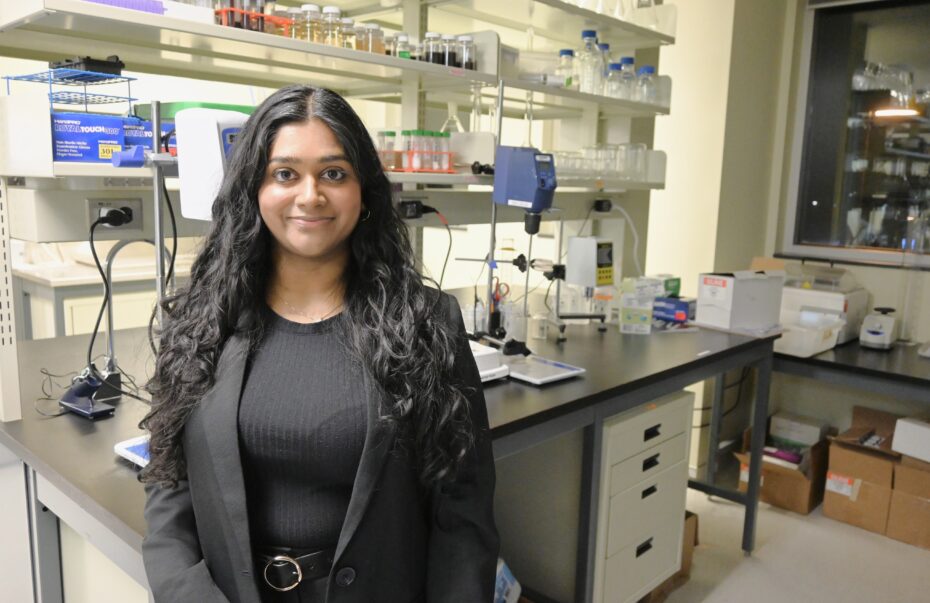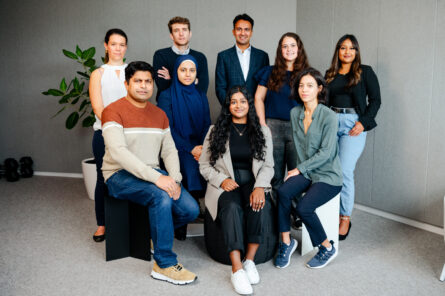
As a young girl growing up in Montreal, Nivatha Balendra (BSc’21) had a boundless interest in science.
“I always loved learning. As a child, I would make presentations to my family whenever I learned about a new science topic and quiz them on it after,” recalls Balendra, who started entering science fairs in Grade 8 and won numerous awards.
Today, Balendra is the founder and CEO of Dispersa, a cleantech company she launched while an undergraduate at McGill.
A sustainable and affordable alternative to traditional surfactants
Dispersa’s goal is to decarbonize the surfactant industry with new biosurfactants made from food waste. Surfactants are chemical ingredients found in everyday products like soaps, detergents, shampoos and cosmetics. Surfactants are often made from petroleum or palm oil; biosurfactants are a sustainable and affordable alternative.
“We take waste oils and waste sugars and harness microbes to transform these into natural biosurfactants, using a proprietary process our company developed,” explains Balendra.
Dispersa raised $3 million in funding last year from Invest Nova Scotia, Dragonfly Ventures, and other investors. This helped the company, whose R&D facility is in the Montreal area, expand. It now has a larger facility in Cape Breton as well, where it is scaling-up production.
“We will be launching our first ingredient, PuraSurf, commercially, in the cleaning products industry, in 2025. Our long-term mission is to bring biosurfactants to as many industries as possible, including cosmetics and personal care,” she says.
Key support from McGill’s Dobson Centre for Entrepreneurship

Balendra launched Dispersa in 2019 as a second-year student at McGill, with help from the University’s Dobson Centre for Entrepreneurship.
Two of her mentors at Dobson – Renjie Butalid, then associate director, and Sabine Landolt, Dobson judge and marketing expert – provided valuable guidance.
“Renjie was very supportive of me and the idea for Dispersa from the start; he urged me to move my research into a business. He was a great support throughout the process and especially at an important moment in my entrepreneurial journey, when I needed to put together a pitch deck for the Women in Cleantech Challenge,” says Balendra, who in 2018 was selected as a finalist in the contest, sponsored by MaRS Discovery District and Natural Resources Canada, and awarded over $1 million in funding, lab support and in-kind resources.
“I learned a lot from the judges by participating in the Dobson Cup competition and it was a great chance to network with other student founders. With her marketing background, Sabine helped us develop our marketing materials as an early advisor,” she adds.
Early research experience with McGill mentors
McGill was a natural post-secondary choice for Balendra, who majored in physiology because of her interest in medicine and health sciences and did a minor in international development.
“McGill is an institution I wanted to study at, considering my early experience at MUHC and the university’s world-class reputation, particularly in health sciences.”
In high school, she had gained invaluable hands-on experience and exposure to how first-class science is done through a mentoring program at McGill University Health Centre (MUHC) labs, where she conducted research for her science fair projects.
“The lab experience was new and exciting,” says Balendra. “I had the opportunity at a young age to learn about different types of research. McGill professors and PhD students shared their valuable time and expertise mentoring me and other students who participated in science fairs. If it were not for my early research experience at MUHC, I wouldn’t have had my eyes opened to how much I enjoyed this field.”
A passion for sustainability
At age 17, Balendra discovered a novel species of oil-degrading bacteria, which produces biosurfactants. This fundamental research was a catalyst for Dispersa.
“I was motivated after the Lac-Mégantic train crash oil spill to find a local solution to the global problem of oil contamination,” says Balendra, who identified new strains of bacteria with biosurfactant-producing capabilities by collecting soil samples in her own backyard and along the St. Lawrence River.
Her time at McGill further sharpened her focus on sustainability.
“The professors in international development were very passionate about sustainability and social impact, values that are central to Dispersa’s mission.” says Balendra.
Upon graduation, Balendra won a Pathy Fellowship, open to students from six universities, including McGill.
“The Pathy Fellowship focused on community-based leadership and social impact.
We are building a business where it is important to instill the values of social, economic, and environmental change as we continue to grow and bring that about in the work that we do every day,” she says.
Entrepreneurial spirit rooted in social values
Social values are as much a part of Balendra’s identity as are her entrepreneurial spirit and scientific curiosity.
“My entrepreneurial spirit is deeply rooted in both community service and creating healthier communities. That comes from my late mother, who is my role model, and my personal experience as a cancer survivor,” Balendra says.
As a socially engaged sustainable business owner, Balendra asks: “How can we create generational impact?”
Her answer: “Our goal is to be a leader in the biosurfactants sector, making affordable, safe and sustainable surfactants mainstream in industries that touch our daily lives. My vision is to help create safer consumer products, for healthier communities. That is what drives me every day.”

Nivatha Balendra is an inspiration, using her science knowledge and interest to develop recycled food waste bacteria to combat oil spills. We also need to reduce our use of oil and gas, greenhouse producing products that have immeasurable human, animal and environmental harms, especially when they are spilled into our waterways.